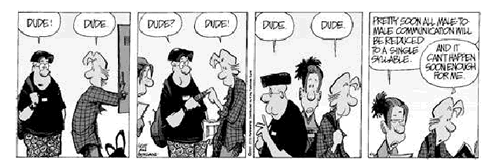December 08, 2004
Dude
Mike Crissey has a story today on the AP wire about Scott Kiesling's recent paper Dude, published in the fall issue of American Speech (supplementary materials here). The AP also provides a sort of quick dude reference guide. The cultural context is set by this cartoon

Kiesling observes that
Older adults, baffled by the new forms of language that regularly appear in youth cultures, frequently characterize young people’s language as “inarticulate” ... For American teenagers, these examples usually include the discourse marker like, rising final intonation on declaratives, and the address term dude, which is cited as an example of the inarticulateness of young men in particular.
He feels that the comic strip exhibits a stereotype that "views the use of dude as unconstrained – a sign of inexpressiveness in which one word is used for any and all utterances". Instead, Kiesling argues that
Dude is developing into a discourse marker that need not identify an addressee, but more generally encodes the speaker’s stance to his or her current addressee(s). The term is used mainly in situations in which a speaker takes a stance of solidarity or camaraderie, but crucially in a nonchalant, not-too-enthusiastic manner. Dude indexes a stance of effortlessness (or laziness, depending on the perspective of the hearer), largely because of its origins in the “surfer” and “druggie” subcultures in which such stances are valued. The reason young men use this term is precisely that dude indexes this stance of cool solidarity. Such a stance is especially valuable for young men as they navigate cultural Discourses of young masculinity, which simultaneously demand masculine solidarity, strict heterosexuality, and non-conformity.
He draws these conclusions not only from his own intuitions as a native of dudespeak, but also from the Dude Corpus, which presents 520 real-life examples in the form of an Excel spreadsheet, and the Dude Survey, also available as a spreadsheet.
A few examples from the corpus:
45. Candy hearts are for third grade, dude.
53. Discrete structures sucks, dude.
61. [responding to a woman who has been "telling a story about a guy trying to hit on her"]: Dude (with a tone of disbelief and disgust).
139. Dude, bandwidth is better than sex.
371. It's like, dude, I can't even take care of myself let alone some squirmy thing.
As Kiesling points out, dude is also now used by and to young women -- two of the examples quoted above were spoken by women, and in three of them, the addressee was female.
It looks to me like the sequence described in the cartoon is consistent with Kiesling's gloss for dude, though I can't quite make out what is happening in the second panel.
Kiesling also suggests class assignments based on extending and analyzing his corpus and survey.
I grew up in pre-dude days, but the patterns of usage that Kiesling describes seem pretty natural and easy to assimilate to me. What I have more trouble with is the current fashion for Significant Capitalization: what's with capital-D Discourse? Kiesling has "the discourse marker like", but "Such a stance is especially valuable for young men as they navigate cultural Discourses of young masculinity"; he has "This indexicality also explains where dude appears in discourse structure", in contrast to "how cultural Discourses of gender are recreated in interaction with the help of dude".
You might think that he's going back to 18th-century ideas about capitalizing nouns, except that this is the only noun affected. I infer that "Discourse" may be meant to index Michel Foucault or maybe Michael Silverstein, whereas "discourse" would index Wally Chafe. In that case, I guess the thing about Discourses is that they're not actually discourses. But I'm out of my cultural depth here.
[AP story via email from Fernando Pereira]
[Update: Jonathan Mayhew pokes a little gentle fun by linking to this post with the quote: "I'm like, Dude... let's navigate the Discourses of juvenile masculinity, and he's like, dude, what are [they] talking about?" I'm not quite sure whether the joke is on Keisling or on me, but it's a good one in any case.
[Update #2: several people wrote in to point out that Kiesling explains his capitalization explicitly in a footnote:
"I use the term cultural Discourse in the sense of poststructuralists, following Foucault (1980). Cultural Discourses are similar to ideologies, yet leave open the possibility of contradiction, challenge, and change, and describe more than idea systems, including social practices and structures. For a review of the term, and its relevance to masculinities, see Whitehead (2002). I will always use a capital D with cultural Discourses to distinguish them from the linguistic notion of discourse, or talk-in-interaction."
So I understood him correctly, but read him carelessly. Thanks to Lauren Marie Squires and and Tom Ace for the tip. ]
Posted by Mark Liberman at December 8, 2004 10:18 AM